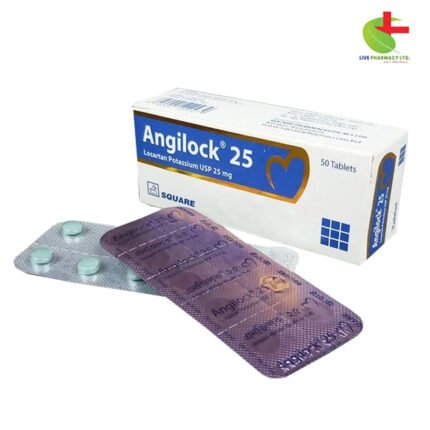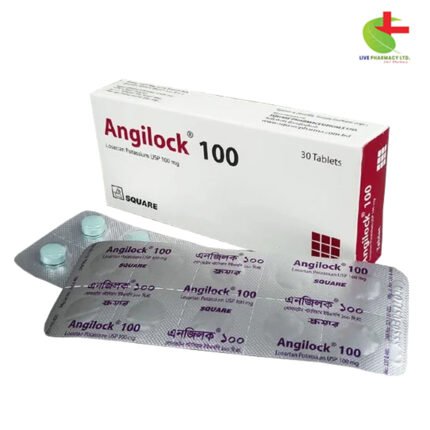Angilock 50
100.00৳ Strip
- Angilock: Your solution for hypertension management and renal protection in type-2 diabetic patients with proteinuria.
- Powered by Losartan Potassium, Angilock effectively targets angiotensin II receptors, regulating blood pressure by reducing vasoconstriction and aldosterone release.
- Flexible dosage options ensure personalized treatment plans for optimal therapeutic outcomes.
- Count on Angilock for mild and transient side effects, prioritizing your well-being with every dose.50.00
 Brand
Brand
|
Square Pharmaceuticals PLC |
|---|---|
 Generics
Generics
|
Losartan Potassium |
Indications
- Management of Hypertension: Angilock serves as a treatment for hypertension, either as a standalone therapy or in conjunction with other antihypertensive medications like thiazide diuretics.
- Renal Protection in Type-2 Diabetic Patients with Proteinuria: Angilock plays a crucial role in delaying the advancement of renal complications in hypertensive type-2 diabetics exhibiting proteinuria, characterized by a urinary albumin to creatinine ratio exceeding 300 mg/g.
Pharmacology
Losartan Potassium, a pioneering non-peptide orally active angiotensin II receptor blocker, selectively binds to the AT1 receptor present in various tissues, such as vascular smooth muscle, adrenal gland, kidneys, and the heart. Its mechanism involves mitigating pivotal biological actions like vasoconstriction and aldosterone release, thereby addressing hypertension.
Dosage & Administration
The typical starting and maintenance dosage for most patients is 50 mg once daily. In cases where the antihypertensive response with 50 mg once daily proves insufficient, a dosage adjustment to 25 mg twice daily is recommended before considering further increments. For individuals with intravascular volume depletion, initiating therapy with 25 mg once daily may be prudent. The dosage of Losartan Potassium ranges from 25 mg to 100 mg per day and can be administered once or twice daily.
- Patients up to 75 years: No initial dosage adjustment is necessary.
- Patients over 75 years: Limited clinical experience necessitates commencing with a lower dose of 25 mg once daily.
Interaction
Several interactions may affect the efficacy of Angilock. For instance, Rifampicin and fluconazole can diminish the levels of its active metabolite. Concurrent usage with hydrochlorothiazide may potentiate its antihypertensive effects. Additionally, caution should be exercised when combining Angilock with potassium-sparing diuretics, potassium supplements, or salt substitutes containing potassium, as it may elevate serum potassium levels.
Contraindications
Losartan Potassium is contraindicated in pregnant women and individuals with hypersensitivity to any component of the product. Furthermore, its use alongside Aliskiren in diabetic patients is discouraged.
Side Effects
Angilock typically induces mild and transient side effects. The most commonly reported ones include dizziness, diarrhea, nasal congestion, cough, and upper respiratory infections. Other less frequent side effects encompass fatigue, edema, abdominal pain, chest pain, nausea, headache, and pharyngitis.
Pregnancy & Lactation
Categorized as Pregnancy Category D, Losartan Potassium poses an increased risk to the fetus, particularly if administered during the second or third trimesters. Its excretion in human milk remains undetermined, necessitating a careful evaluation of the benefits versus risks before nursing while on this medication.
Precautions & Warnings
Special considerations should be given to the use of Angilock during the second and third trimesters of pregnancy to avoid adverse effects on fetal renal function and mortality. In patients predisposed to intravascular volume depletion, symptomatic hypotension may ensue, especially with high-dose diuretic therapy. Notably, cirrhotic patients may exhibit significantly increased plasma concentrations of Angilock, warranting dosage adjustments.
Use in Special Populations
- Renal Impairment: Dosage adjustments may be warranted based on the severity of renal impairment.
- Hepatic Impairment: Patients with a history of hepatic impairment may require lower doses of Angilock.
Therapeutic Class
Angilock falls under the therapeutic class of angiotensin II receptor blockers.
Storage Conditions
Store Angilock in a dry area, shielded from light and heat, and out of children’s reach.













Reviews
There are no reviews yet.